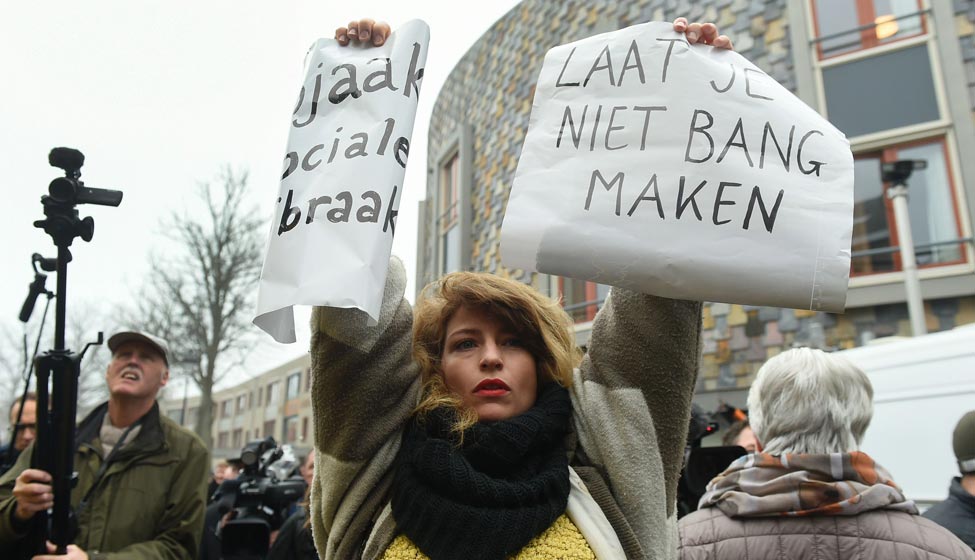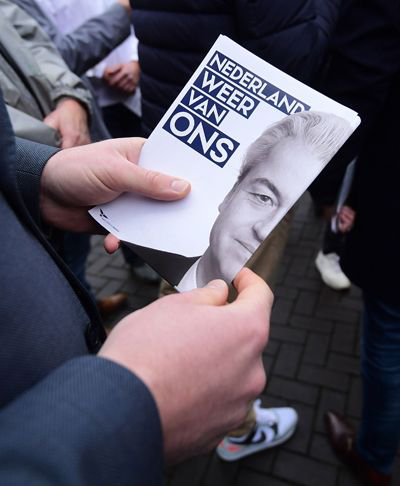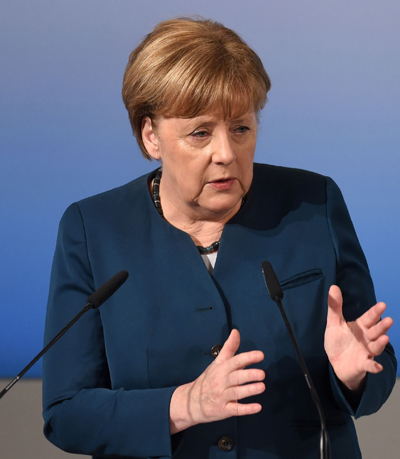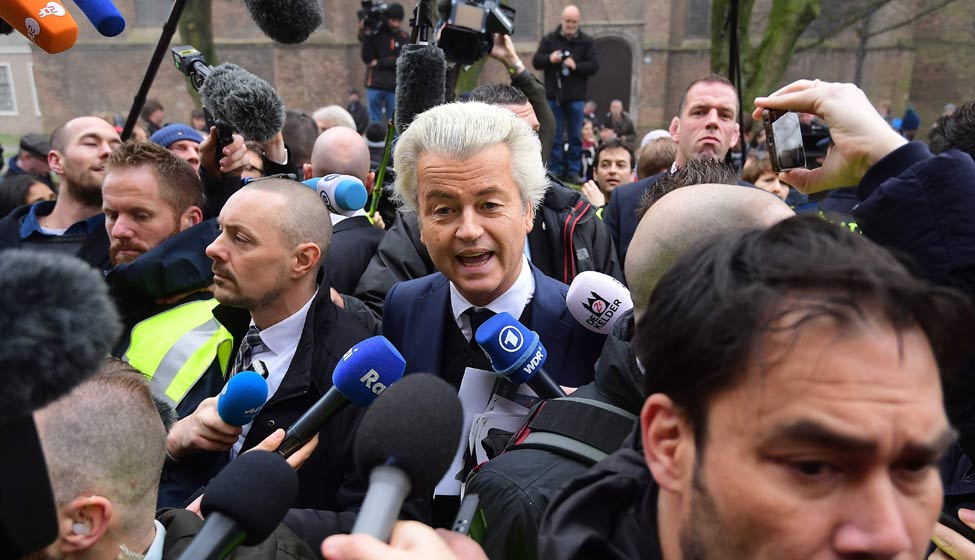As the campaign for the Dutch parliament election has just got under way, the latest opinion polls indicate that the far-right Party for Freedom (PVV), led by maverick politician Geert Wilders, is in the lead. All the opinion polls predict a fragmented result, which necessitates a multiparty government consisting of four or more parties.
On current trends, however, there has been a drop in the vote share of PVV (Partij Voor De Vrijheid) recently. Poll forecast by Kantar Public says Wilders can now gather 27 seats, down from 35 seats predicted a fortnight ago. Another pollster, Gfk Global, grants 26 seats to Wilders, down from 31 seats for the same period. It is expected that PVV will get 20 per cent of the votes.
Closely behind is Prime Minister Mark Rutte's conservative party VVD with its share of 16 per cent of votes. However, Rutte is confident that the performance of his government which lifted the economy out of the recession years of 2012-14 would come to his help.
Polls predict around 10 per cent votes and 15 seats for the centrist liberal party, D66, which has been asking for more cooperation among the European nations. The party wants more emphasis on English in the secondary schools and colleges so as to attract the best talents from all over the world.
While major parties have suffered a decline, unconventional parties like Green Left and 50 Plus—a pensioners' political party—have gained popular support. Christian parties still do well in the so called 'Bible Belt'. Another big loser in the polls is the social-democratic political party PvdA, currently a partner in the coalition government led by VVD.
The political rivals of Wilders are pinning their hopes on PVV’s usual kind of under-performing on the poll day.
The share of the major parties has consistently fallen in the Dutch parliament. Three main parties accounted for 89 per cent of the seats in 1986. Their share was just over 60 per cent in 2012. Opinion polls predict that their share will drop to 42 per cent in the coming election.
It is evident that traditional parties are losing out to populist parties.
There are no less than 30 parties in the fray and 14 of them will win at least one seat. Eight parties may get 10 or more seats with none capturing more than a quarter in the 150-member lower house. Result: no single party will get the required 76 seats to form a government.
However, a clear picture is yet to emerge as a major portion of voters—Reuters says 37 per cent and The Economist says 70 per cent—are still undecided about their political choice. Similar to the Brexit and the US elections, the undecided voters may swing the polls in favour of the anti-establishment. Wilders is counting on this new trend sweeping across the world.
 A woman supporter of Geert Wilders holds a poster reading "Don't let yourself be afraid" at his campaign on February 18, 2017. Photo: AFP
A woman supporter of Geert Wilders holds a poster reading "Don't let yourself be afraid" at his campaign on February 18, 2017. Photo: AFP
Winners won't quit
Top political leaders have ruled out a coalition that includes Wilders. They say his anti-European Union, anti-Islamic agenda would not work in a coalition set-up and therefore, he would not be acceptable as prime minister even if PVV secures more seats. In this situation, forming a government with Wilders as the head would be extremely difficult.
Chances are that Rutte may try to form a centrist coalition with smaller parties. But if other parties unite to keep Wilders out of power, he might use it to his advantage as his omission would sound like rejecting the will of the people.
Forming a coalition government in the Netherlands might take months. A two-party alliance in 1977 took nearly seven months to form. However, any political formula that could accommodate Wilders in a ruling coalition might evolve after the polls.
'Patriotic spring’
Wilders’s controversial statements and rhetoric against immigrants had put him in trouble on many occasions.
At a political rally in the Hague on March 19, 2014, held after the municipal elections, Wilders asked:
“In this city and the Netherlands, do you want more or fewer Moroccans?”
“FEWER FEWER FEWER,” the crowd chanted.
“Allright, then we're going to have it,” Wilders assured the cheering supporters.
The event went live on Dutch TV, and played over again and again, followed by discussions and debates. It was posted on YouTube for more people to watch it later.
Infuriated citizens—more than 5,000 in number—jointly filed a petition seeking action against Wilders for leading the chant against citizens of Moroccan origin. On December 9 last year, a three-member jury found Wilders guilty of inciting discrimination and insulting a section of society. However, the court decided not to impose a fine of 5,000 euros as requested by the prosecution.
Britain’s exit from the European Union and Trump's aggressive victory in the United States have brightened his spirits.
Wilders’s 11-point agenda elaborates his 'Make the Netherlands Ours Again' slogan. He wants tight border control that closes doors to Muslim immigrants. A stubborn eurosceptic, he wants to take the Netherlands off the bloc. His aim is to restore the Dutch pride including the guilder.
 A supporter of Geert Wilders holds a leaflet at his election campaign in Spijkenisse. Photo: AFP
A supporter of Geert Wilders holds a leaflet at his election campaign in Spijkenisse. Photo: AFP
Wilders is an admirer of Donald Trump and he has praised Trump's travel ban on people from seven Muslim majority countries and even called the ban being extended to cover Saudi Arabia as well. He suggests a protectionist policy similar to that of 'Trump's 'America First' for the Netherlands. He says he would enforce ban on Shariah law in order to 'de-Islamise' the country. Immigrants involved in crimes or those who do not like Dutch values would have to go back to land of their origin. The Netherlands is not the place for people who cannot assimilate its culture. However, he says law-abiding Muslim citizens would not be affected by his policies.
As a young man, Wilders had volunteered in Israel and loves the Jewish state. In an interview, he likened mosques to Nazi temples and the Qur’an to Mein Kampf. "A lot of people from Islamic backgrounds don't care a bit about our values, our culture, our identity, our freedom—or the rights of women not to be harassed," Wilders told National Public Radio last December. The 53-year-old Wilders wants to lead the Netherlands to its white, Christian roots. He says he would close down the mosques and restrict the Quran for scholarly use. Wilders enjoys overwhelming support among unemployed people and those 'affected' by foreigners. His supporters like him when Wilders vows to protect liberal Dutch values from Islamic threat.
Wilders's rise from a one-man army to a powerful political force is astounding. In December 2016, a Dutch news channel chose him the politician of the year for the fourth time. Wilders is top on the hit-list of terrorists. He lives in fortified houses and is surrounded by bodyguards whenever he ventures out.
Look to the past
The story of immigrants to the Netherlands begins with the arrival of a few people from the former Dutch colony of Indonesia in the 1950s. Workers from Turkey and Morocco were brought to meet a shortage of labour faced by the Dutch companies in the 1960 and 1970s. After the Netherlands co-founded the EU in 1993, a large number of people started pouring in through its free borders. Soon the Dutch people began to feel the 'presence' of immigrants whose population had risen to 10 per cent. In some areas in the port city of Rotterdam, migrants are in majority. They are mostly children of Turks and Moroccans.
Anti-Islamic sentiments in the Netherlands reached its peak after the brutal murder of Dutch filmmaker Theo van Gogh by a Dutch-Moroccan Muslim on an Amsterdam street in November 2004. Dutch Muslim community was outraged by his critical movie on the treatment of women in Islam. The murder promoted millions of Dutch people attended rallies for freedom of speech, in protest against the murder.
Swing to the right
Dutch elections are a frontrunner to the three major European elections in this year. Polls in France and Germany later this year are crucial for the future of Europe.
A two-stage French presidential election is scheduled for April and May. Opinion polls suggest that the top issue in this election is security. The series of terrorist attacks in France and the rest of Europe since 2015 have raised the demand for a tight border. As of now, far-right anti-immigrant and anti-European Union National Front led by Marine Le Pen is ahead in opinion polls with 26.5 per cent vote.
 German Chancellor Angela Merkel's popularity has plummetted over the issue of refugees. Photo: AFP
German Chancellor Angela Merkel's popularity has plummetted over the issue of refugees. Photo: AFP
Election to Bundestag, the federal parliament of Germany, will be held on September 24, 2017. Re-election bid of German Chancellor Angela Merkel has been badly hit. Right-wing Alternative for Germany (AfD) party and her rival Martin Schulz of the Social Democratic party have become more acceptable in the recent months owing to Merkel's refugee policy.
Will the EU fall apart?
Far-right and populist parties and Europe’s anti-establishment figures are flexing their muscles in western Europe. With euroscepticsm on the rise and right-wing parties upsurging, the unity of Europe is under duress. The six founding members of the EU—the Netherlands, France, Belgium, Germany, Luxembourg and Italy—are struggling to keep the EU united. Most people think that a Dutch departure could be beginning of the end of the EU.
The Netherlands has so far maintained its long tradition of encouraging liberal social values as opposed to extremism. Political pundits say that the same crowd who support Wilders may oppose the extreme views of Wilders in the future. But for now, they support Geert Wilders, as his party seems to fight for their national identity.





